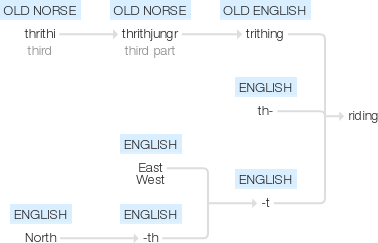Riding
Old English trithing, from Old Norse thrithjungr ‘third part’, from thrithi ‘third’. The initial th- was lost due to assimilation with the preceding -t of East, West, or with the -th of North .
wiktionary
From Middle English rydyng; equivalent to ride + -ing.
From trithing (initial /t/ absorbed into preceding north, south, east, west, inner ‘th’ already sometimes /d/ in Middle English), from Middle English trithing, tridinge, from Old English *þriðing, from Old Norse þriðjungr(“third part”), from Proto-Germanic *þridjô(“third”) (English third). Equivalent to third + -ing; compare with farthing(“fourth part”). Cognate with English trithing.
The folk etymology that connects the term to the area a horse-rider could cover in a single day is incorrect, but may have influenced the spelling and pronunciation.
etymonline
riding (n.1)
c. 1300, "an act of riding on horseback," especially in a festival procession, verbal noun from ride (v.). Meaning "teasing, annoying" is from 1927. As an adjective, "suitable for or associated with riding," Old English ridende. Riding-hood, originally a large hood worn by women when riding or exposed to weather, is from mid-15c., later a fashionable article of outdoor wear (18c.). Riding-boots, kind of high boots worn in riding, is from 1630s.
riding (n.2)
one of the three districts, anciently under the government of a a reeve, into which Yorkshire was divided, late 13c., from late Old English *þriðing, a relic of Viking rule, from Old Norse ðriðjungr "third part," from ðriði "third" (see third).
The initial consonant apparently was merged by misdivision with final consonant of preceding north, west, or east.
